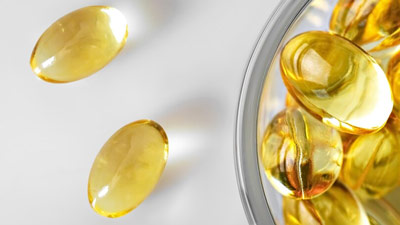
Not all fats are unhealthy. Healthy fats like omega-3 fatty acids not only support your heart health but also boost your cognitive functions. In an interaction with the OnlyMyHealth team, Dr Preeti Nagar, Dietitian at Noida International Institute of Medical Sciences (NIIMS) College and Hospital, suggests that these reduce inflammation, lower triglycerides, and improve overall cardiovascular function. Not just that. They also support joint health, reduce the risk of age-related macular degeneration, and contribute to healthy skin.
Table of Content:-
For people who are not able to get optimum levels of omega-3 fatty acids from their diet alone, experts often recommend fish oil, which is a dietary supplement. However, it is a by-product of fishing that comes from the tissues of fatty fish, such as herring, mackerel, salmon, tuna, anchovies, and cod. So what are the alternatives for vegetarians? Dr Nagar sheds light on the same and shares how much omega-3 fatty acid is generally recommended for all.
Also Read: Healthy Fats For Heart Health: Foods You Can Add To Your Diet
Daily Recommended Intake Of Omega-3 Fatty Acid

According to the Office of Dietary Supplements (ODS) of the National Institutes of Health (NIH), the three main omega-3 fatty acids are alpha-linolenic acid (ALA), eicosapentaenoic acid (EPA), and docosahexaenoic acid (DHA).
ALA is primarily found in plant oils such as flaxseed, soybean, and canola oils, whereas DHA and EPA are found in fish and other seafood.
The recommended daily intake levels of omega-3 fatty acids can vary based on age and specific health conditions, says Dr Nagar.
Here are general guidelines for different age groups:
- Children (1-3 years): 700 mg of EPA and DHA combined per day.
- Children (4–8 years): 900 mg of EPA and DHA combined per day.
- Children and adolescents (9–13 years old): 1,200 mg of EPA and DHA combined per day.
- Adults (14–18 years and older): 1,500–2,000 mg of EPA and DHA combined per day.
What Is Fish Oil?
Omega-3 dietary supplements generally include fish oil, krill oil, cod liver oil, and algal oil, which is a vegetarian source that comes from algae.
Fish oil comes from many different types of fish, including mackerel, herring, tuna, and salmon, and is rich in two important omega-3 fatty acids called EPA and DHA.
Are There Vegetarian Alternatives To Fish Oil?

According to Dr Nagar, for individuals following a vegetarian or plant-based diet, sources of omega-3 fatty acids that can replace fish oil supplements include:
- Flaxseeds and flaxseed oil
- Chia seeds
- Walnuts
- Hemp seeds
- Algal oil, derived from algae
She says, “Plant-based omega-3 sources contain ALA, which the body can convert into EPA and DHA, although the conversion rate is lower compared to direct consumption of EPA and DHA from fish oil.”
She adds, “While plant-based sources are beneficial, direct consumption of EPA and DHA from fish oil may be more effective in raising Omega-3 levels in the body.”
Also Read: Improve Heart Health With Omega-3 Fatty Acids: Foods To Eat And When To Switch To Supplements
How To Incorporate Vegetarian Sources Of Omega-3 Fatty Acid

Here’s how you can include vegetarian sources of omega-3 fatty acids in your diet:
- Add ground flaxseeds or chia seeds to smoothies, oatmeal, or yoghurt.
- Use walnuts as a topping for salads, cereals, or baked goods.
- Include hemp seeds in salads, soups, or homemade energy bars.
- Cook with flaxseed oil or hemp seed oil for salad dressings or drizzling over dishes.
- Consider algal oil supplements for a direct source of EPA and DHA.
[Disclaimer: This article is for informational purposes only. Hence, we advise you to consult your own doctor or dietitian if you are dealing with any health issues to avoid complications.]
Also watch this video
How we keep this article up to date:
We work with experts and keep a close eye on the latest in health and wellness. Whenever there is a new research or helpful information, we update our articles with accurate and useful advice.
Current Version